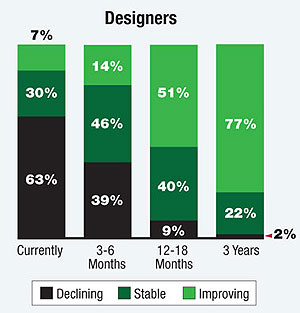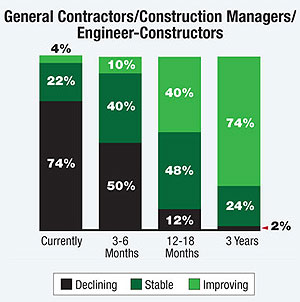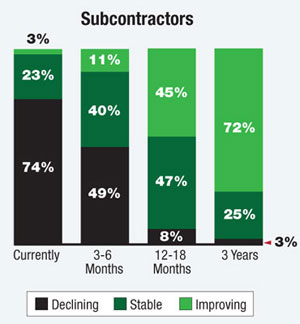The industry downturn that started in early 2008 and blossomed during the financial collapse late last year has continued unabated throughout 2009 and shows little signs of changing. The optimistic attitude shared by many in the industry that an economic rebound is just around the corner slowly is giving way to the realization that the industry is in for a long recession.




The ENR Construction Industry Confidence Index (CICI) for the fourth quarter shows executives from 941 construction firms are not confident the recession will end anytime soon, although some see some evidence of a slow upturn in 2010. The index for the fourth quarter is marginally lower, standing at 31 on a scale of 100. This is a one-point decrease from the previous quarter’s level of 32 and a six-point improvement over ENR’s first-ever CICI of 25 for the first quarter.
The index measures industry sentiment about the current market and beliefs about where it will be in three to six months, as well as in 12 to 18 months. An index of 50 would mean a neutral or stable market. The index is based on the responses to a survey sent to over 2,000 U.S. construction-industry firms on ENR’s Top Lists. The latest index is based on a survey conducted from Nov. 17 to Dec. 4.
Of the 941 firms responding to this quarter’s CICI survey, 71% say the current construction market is declining, 24% believe it has stabilized, and only 4% say it is improving, virtually the same percentages as in the third quarter. Design firms, which would be on the front end of any turnaround, are somewhat more optimistic about a quicker recovery than the contractor community.
There is little difference in firms’ attitudes about recovery on a regional basis. The big disparity, as in past surveys, is between the public- and private-sector building markets.
Applying the ENR CICI formula to individual market sectors, power is on top, with a CICI rating of 61 on a scale of 100, followed by water/sewer/waste at 59 and transportation at 58. Survey participants give the environmental market a 55.
Among building markets, health care fares the best at a 57 out of 100, while the K-12 and higher-education markets come in at 49 and 50, respectively. The expectations about the commercial, retail, hotel/hospitality, distribution/warehouse and entertainment/civic markets all fall below the median.
CFMA Sees Little Change
Another survey that sees a pause in industry optimism is the most recent CONFINDEX survey, which is about to be released by the Construction Financial Management Association, Princeton, N.J. CFMA polls 200 chief financial officers from general contractors, subcontractors and heavy and civil contractors. “Our CONFINDEX went from 91 to 90 this go-around,” says Jim Bartsch, CFMA director of research and analysis. “This shows things are beginning to stabilize.” CFMA’s index is based on a scale of 200, with 100 being a stable market.
Bartsch notes that the CFMA survey finds slight gains in overall confidence in current business conditions but more reason for caution for the longer term. While financial officers at CFMA member-contractors see a slow improvement in business conditions, backlog and availability of bank credit in 2010, the survey indicates these executives worry the new year may bring a deterioration in the availability of surety capacity, Bartsch says.
“The executives I talk to around the country say that insurance and surety will be the wild card in 2010,” says Peter Schwartz, president and CEO of CFMA. He says the troubles in the nation’s financial sector may result in a tightening of surety availability, and this worries many contractors.
Regulatory Uncertainty
The ENR CICI survey allows participants to add comments about the markets and market conditions. Over a third of the firms in the survey provided opinions on the current market. The single-biggest complaint is the lack of bank financing for projects. Many firms point out that even the most investment-worthy projects are having trouble obtaining financing.
However, many express concern about the regulatory environment under the Obama administration. Some participants say the administration has not done enough to free up capital for investment, while others believe that the current climate is not business-friendly.
Not all agree. “Some firms may complain about the federal government, but there is no reluctance in pursuing federal work,” says CFMA’s Schwartz. He notes that in CFMA’s 2009 Construction Industry Annual Financial Survey, many contractors said they are actively recruiting individuals with experience in federal- project procurement. “Contractors are out looking for people who know how to work for public agencies,” he says.

ENR Construction Industry Confidence Index: 31
Down One Point
The CICI once again asked for survey participants’ opinions on the stimulus provisions of the American Recovery and Reinvestment Act. In this quarter, only 2% strongly agree that ARRA is good for the industry, but 33% generally agree it is good for construction. This time, 45% did not agree that ARRA is good for the industry, down from 49.5% last quarter.
The survey also asked participants whether they received any work under ARRA. A total of 216 out of 941 say their firms had won ARRA work. These firms claim they won a total of 1,010 contracts, worth approximately $3.8 billion.
ENR asked survey participants if stimulus work had created or saved jobs at their firms, one of the principal aims of ARRA. Of the 941 firms in the survey, 115 say stimulus work saved a total of 2,609 jobs. Also, 39 firms say ARRA projects created 477 jobs at their firms. While a large percentage of the jobs saved or created were in heavy and highway contractors, many subcontractors also report job savings, particularly those in mechanical, electrical and concrete specialties, as well as a few engineering firms in civil and mechanical-electrical-plumbing.


Post a comment to this article
Report Abusive Comment